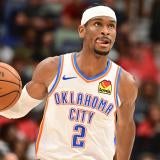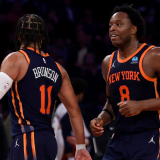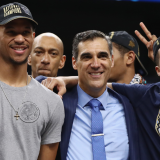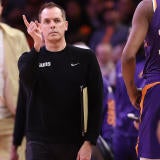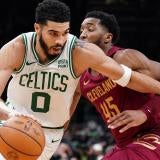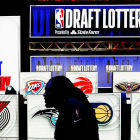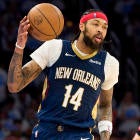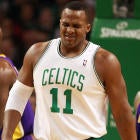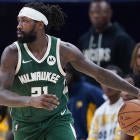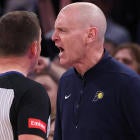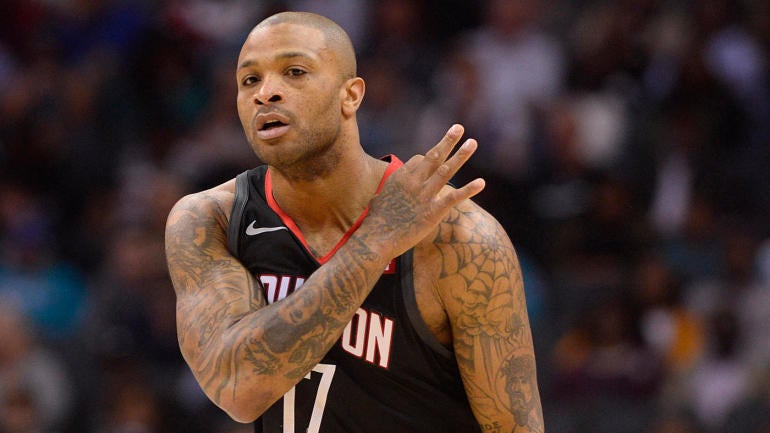
The Houston Rockets are trading P.J. Tucker, Rodions Kurucs and Milwaukee's 2022 first-round pick back to the Bucks in exchange for D.J. Augustin, D.J. Wilson and an unprotected 2023 first-round pick, according to ESPN's Adrian Wojnarowski. In addition, Houston gained the right to swap its 2021 second-round pick for Milwaukee's 2021 first-round pick, provided the Bucks do not pick in the top nine. The Bucks are also trading forward Torrey Craig to the Phoenix Suns, according to Wojnarowski. The Rockets had previously taken Tucker out of the lineup when it became apparent that a trade was coming. Now, he has his wish. He'll join a championship contender in the Bucks while Houston continues its move toward a rebuild.
Tucker, now 35 years old, has previously been one of the most versatile forwards in the NBA. In fact, calling him a forward might not even be accurate. Really, he's a small-ball center, an increasingly important sort of player to have in the postseason when the best teams tend to downsize. Tucker has filled that role brilliantly in the past. Whether or not he can still do so at his age is unclear.
The Rockets, meanwhile, are pushing full steam ahead into their rebuild. Tucker is likely the first of several veterans to get dealt at the deadline, with rumors also surrounding Victor Oladipo and, prior to his injury, Eric Gordon. Houston has now lost 17 games in a row. The absence of Christian Wood is partially responsible, but in truth, the Rockets simply are not built to win now. They have recognized that and continue to prioritize draft capital in response.
Tucker is one of the first major dominos to fall this deadline. Almost every contender had reportedly inquired about him at some point. He fits on virtually any winning team, and now, in a contract year, he'll have a chance to prove his worth to the rest of the NBA during a playoff run in Milwaukee. Here is how both teams grade in the deal:
Milwaukee: A-
The success or failure of this trade is going to come down to how much Tucker still has left in the tank at 35. His season has been discouraging, to say the least. After shooting over 39 percent on corner 3-pointers over the past four seasons, he's down to 33.8 percent this season. Most defensive metrics hint at a meaningful but not overwhelming decline. The eye test has been similarly discouraging. It's hardly surprising given his age, but Tucker isn't moving quite as nimbly as he once did. He's still strong enough to contend with centers, but just how effectively he can still switch onto perimeter players is still something of a mystery.
The Bucks are betting that he has at least one more run in him. It's an entirely justifiable wager. After all, Tucker spent years getting spoon-fed clean looks by James Harden. Harden's departure disrupted the entire offense, and Tucker has been a victim. He averaged almost 3.5 wide-open 3-pointers per game over the past two seasons. Now he's down to 2.1. Milwaukee should have little trouble replicating the shots that Harden created for Tucker.
This trade is about defense, though, and even if Tucker isn't quite himself, he's still almost certainly an upgrade. The Bucks had the NBA's No. 1 ranked defense in each of the past two seasons, but have fallen to No. 10 this season. To some extent, that's by design. Milwaukee's drop-coverage has been exposed in the past two postseasons, so the Bucks are switching more in an effort to prepare for the postseason. Brook Lopez is simply too slow to effectively participate in that plan, and unsurprisingly, Milwaukee's defense has been 5.3 points per 100 possessions better with him on the bench. The Rockets had the NBA's best defense by a full 1.9 points per 100 possessions between the Harden trade and Wood's injury, and Tucker's part in that success indicates that he can still be valuable when his team is competitive.
Aside from Draymond Green, no small-ball center has been better at switching defensively over the past several years than Tucker. Houston was so comfortable playing Tucker at center that they abandoned their traditional big men entirely last season. Milwaukee won't do the same. Lopez is still a valuable rim-protector, and the Bucks will likely still play drop coverage with their starters and against certain opponents. But they have to be able to switch if they plan to contain Brooklyn's shooting. Tucker, at the very least, is better than Lopez at doing so. If he's his old self? The Bucks are an elite defense again.
That covers the basketball portion of the deal. The asset portion is just as important. By making D.J. Augustin the primary salary filler in the deal, Milwaukee not only escaped the final fully guaranteed year on his contract, but moved off of a player that may have been doing more harm than good this season. Augustin is making 38 percent of his 3-pointers, but only 34.9 percent of his 2s. His assist rate has declined considerably, and his tiny stature makes him a defensive negative. Finding a replacement won't be easy, but Milwaukee actually managed to give itself a bit of extra flexibility in this deal.
The Bucks created around $3 million in extra room beneath the hard cap with these moves, but perhaps more importantly, Milwaukee is now below the luxury tax line. Ownership would certainly love to stay there given the years of tax payments coming and the long-term threat of the repeater tax looming, but should the Bucks choose to be aggressive and jump back above the line, those savings make any subsequent deals Milwaukee considers slightly easier from a cap perspective. The notion of Milwaukee making multiple deadline acquisitions seemed ridiculous prior to this one considering its lack of assets, but the Bucks actually, in a sense, replenished its asset base with this deal. Why? They tapdanced around the Stepien Rule, which prevents teams from being without first-round picks in consecutive years. The Bucks had previously sent their 2022 first-rounder to Cleveland, but because they got it back in this trade, their 2021 first-round pick became tradeable. They essentially swapped it for Houston's 2021 second-round pick, which they can now trade. That pick will likely land somewhere in the low 30s, making it a worthwhile chip.
Does that mean the Bucks are going to turn around and replace Augustin with it? Possibly, but matching salary will still be difficult for them. Wilson and Augustin are gone, and Kurucs cannot be aggregated as salary. That leaves the Bucks three reasonably-sized pieces of flotsam: Pat Connaughton, Bobby Portis and Bryn Forbes. All three play key roles in the rotation, but they combine to make roughly $10 million. If the Bucks are confident they can replace them on the buyout market, it might be worth exploring what they could get for some combination of the three along with that Houston pick. Even if they do nothing, they've probably saved themselves a bit of money by ducking out of the first round of this year's draft as second-round picks aren't subject to the rookie scale.
All in all, this is about as good a deal as Milwaukee possibly could've made at the deadline given its salary and asset constraints. Tucker isn't quite the player he once was, and the risk of trading an unprotected pick under any circumstances is meaningful, but the Bucks got exactly the sort of piece that they needed and they did so in a way that makes them more flexible in the short term. That's a big win for Milwaukee as it attempts to build a roster capable of competing with Brooklyn in the Eastern Conference.
Houston: B
This is a fascinating trade from Houston's perspective. Technically, the Rockets didn't actually gain any picks, and you could argue that means they didn't gain much value either. They upgraded their 2021 second-round pick into a first-rounder, but remember whose picks those are. There is a non-zero chance that the Bucks pick last in the first round and the Rockets pick first in the second, essentially giving Houston a one-slot upgrade. Realistically, it's probably closer to five or six slots, but that's not much especially when you factor in the value of second-round picks not being subject to the rookie scale. They then flipped a 2022 first-round pick into a 2023 first-round pick from the same team, neither of which came with any protections. Again, on paper, that's not a slam dunk.
But think a bit more critically about Milwaukee's situation and Houston's motives become clearer. Jrue Holiday is 30. Brook Lopez is 32. Tucker is 35. This is an old team, and it's not one well-positioned to reload through the draft or free agency. The Bucks are all-in on the present. Their future, even with Giannis Antetokounmpo in place, is a bit dicier. On the off chance that Antetokounmpo grows dissatisfied in Milwaukee between now and 2023? This pick becomes significantly more valuable. Even if he doesn't, the age of his supporting cast suggests that the 2023 pick is going to be a few slots higher than the 2022 pick they already had.
Let's say Milwaukee upgrades by even five slots in 2021, and the 2023 pick is five slots better than the 2022 selection. Considering where those upgrades are coming in the draft, they're almost certainly worth more than the sort of second-round picks that Houston was likely offered for Tucker. If the Rockets could have gotten an unencumbered first-round pick for him, they would have done so. That they didn't suggests that most teams were only offering seconds, so the Rockets got creative. In the process, they created more value than they would have by simply taking picks likely to land in the 40s or 50s.
That leaves Houston in a relatively strong position entering the 2021 draft. They now have three first-round picks: Portland's, Milwaukee's, and either their own or Miami's depending on whether or not they land in the top four. Having those two extra first-round picks gives the Rockets ammunition to move up even if they do lose their own pick in that swap with the Thunder. That's well worth a 35-year-old on an expiring contract that wasn't garnering any better offers.







